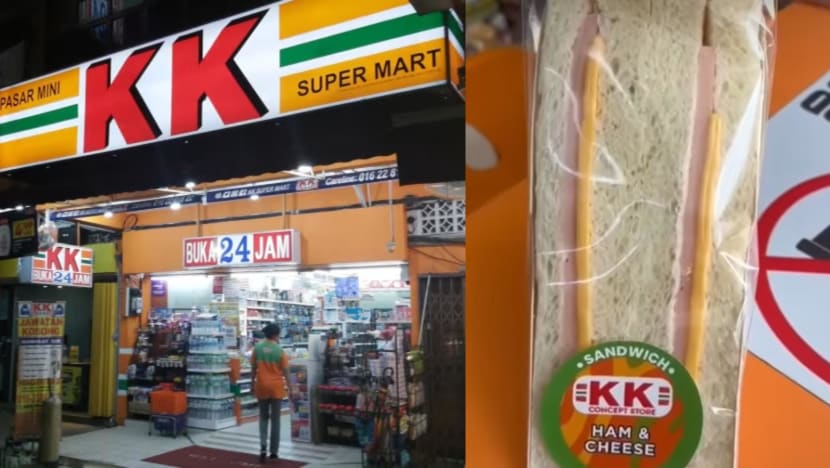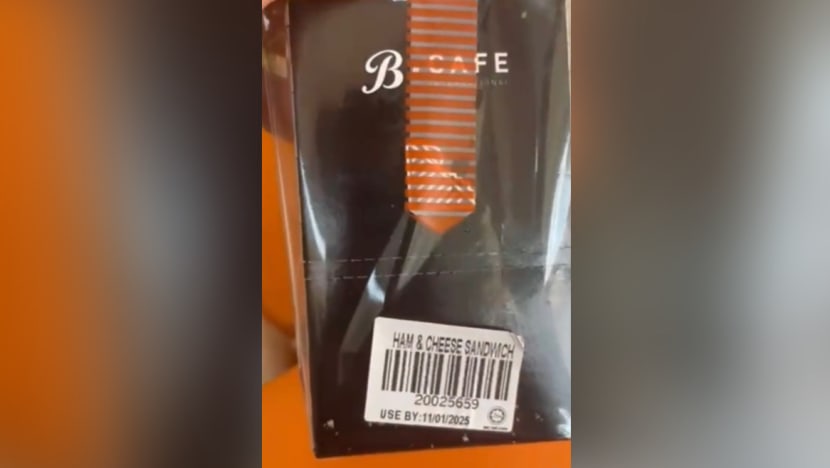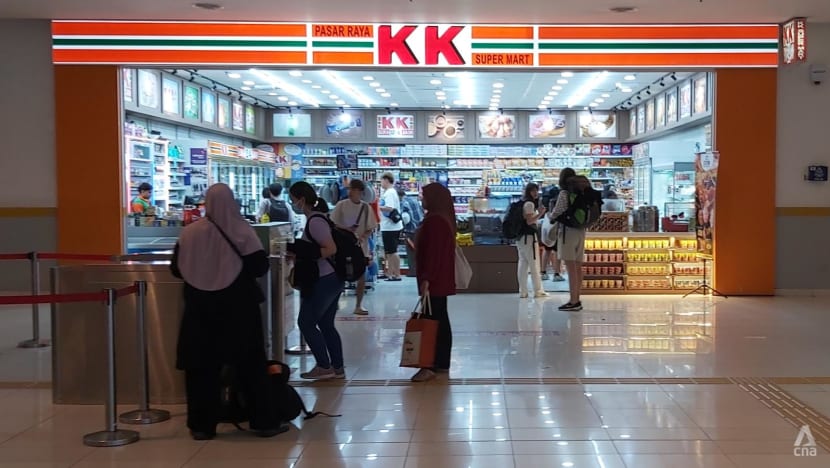Malaysia vows tough action against halal logo misuse amid furore over convenience store ham and cheese sandwich
Malaysia’s Department of Islamic Development (Jakim) confirmed that the ham and cheese sandwich sold at a KK Mart convenience store in Universiti Malaya and the supplying company do not possess the official Malaysian Halal Certification (SPHM).

Ham and cheese sandwiches allegedly without the official Malaysian Halal Certification (SPHM) were sold at a KK Mart outlet in Universiti Malaya. (Photo: CNA/ Rashvinjeet S Bedi, TikTok/@pembinaum)
KUALA LUMPUR: Businesses that misuse the halal logo will be taken to task, said Malaysia’s religious affairs minister amid a furore over a ham and cheese sandwich sold by a convenience store chain.
The sandwiches were sold with the logo despite allegedly not being officially certified.
Mohd Na’im Mokhtar ordered the Department of Islamic Development (Jakim) and the Ministry of Domestic Trade and Cost of Living (KPDN) to enforce actions on those caught misusing the logo to label food products, calling it a “serious offence”.
“The Prime Minister’s Department (Religious Affairs) would like to warn all parties not to misuse the halal logo label on any product produced,” he said in a statement on Monday.
Na’im’s statement came in light of an incident at a 24-hour convenience store at Malaysia’s top university Universiti Malaya (UM), where "ham and cheese" sandwiches allegedly without the Malaysian Halal Certification (SPHM) were sold with the halal logo on their labels.
"The Prime Minister’s Department (Religious Affairs) will not compromise on issues involving public integrity and interest,” Na’im said in his statement, as quoted by local media.
“All parties are urged to consult Jakim and state Islamic religious authorities on halal-related matters,” he added, expressing regret over the incident.
Earlier, Jakim posted a media statement, confirming that the ham and cheese sandwich sold at KK Super Mart - more commonly known as KK Mart - at the public university premises, as well as the company producing the product does not possess the official SPHM halal certification, although it has a halal logo printed.
“Therefore, the company’s act of printing a halal logo on the product is an offence under the Trade Descriptions Act 2011 (Act 730) and legal actions will be taken by KPDN,” the department of Islamic development said on Monday.

Police also confirmed on Monday that students from the top university had filed a report on Friday, expressing doubts about the halal status of the sandwich sold at the convenience store at his campus.
“The case has been directed to the Islamic development department (Jakim) and the domestic trade and cost of living ministry to take further actions,” the Chief Police Officer of Brickfields neighbourhood in Kuala Lumpur, Ku Mashariman Ku Mahmood, told local media Sinar Harian on Monday.
UM on Friday ordered the immediate closure of two 24-hour KK Mart stores on its campus amid allegations of the misuse of the halal logo.
“The directive was issued to ensure investigations on the allegations could proceed without any interference and the outlets will remain closed until further notice,” the university said on Friday, adding that it is committed to ensuring all products sold on the campus are sourced from suppliers that comply with the required regulations.
Prior to that, a student representative from the university’s Islamic Youth Association posted a TikTok video claiming that the halal certification printed on the ham and cheese sandwich sold at the KK Mart convenience store at his campus “may be fake”.
"As far as I know, the halal logo on the sandwich does not comply with Jakim's specifications," the student alleged in the video posted on Friday.
The TikTok video also showed a scan and search on the official Malaysia Halal Status Verification website, highlighting that neither the sandwich nor the supplier has a halal certification.
According to the Malaysian Domestic Halal Certification Procedure Manual, in order to obtain a halal certification, the name of the company, product or menu must not refer to non-halal or other “misleading terms”, including “ham”.
KK Mart has said that the sandwiches contain chicken ham, according to Malaysiakini.
According to media outlet The Rakyat Post, ham products that are certified halal are usually labelled as "chicken ham" or "turkey ham".
“Let’s boycott KK Mart,” a netizen commented on another TikTok post by UM's Islamic Youth Association on Monday.
“If it is indeed chicken ham, indicate ‘chicken ham’ in the label,” another netizen commented on a separate TikTok post on Monday (Jan 13).

Local media reported that KK Mart had suspended all business dealings with the ham and cheese sandwich supplier, Shake and Bake Cafe, and halted the supply of its sandwiches to all its outlets.
“Only 16 KK Concept Stores carry this product,” it said in a statement on Monday.
The store chain also told the media that it had issued a letter of demand on Friday to Shake and Bake Cafe through its legal team and filed a police report the following day.
“Shake and Bake Cafe Sdn Bhd provided a halal certificate for the chicken ham and cheese layers for our reference … the (halal) labelling was done by Shake and Bake Cafe,” it said.
KK Mart also said that it was aware of a raid conducted last Friday on Shake and Bake Cafe’s factory by the Islamic development department and the domestic trade and cost of living ministry and has expressed readiness to fully cooperate with the authorities.
“To safeguard the trust and safety of our customers, full cooperation will be provided to ensure strict action is taken against any party that undermines the confidence and well-being of our customers,” it said, as quoted by Free Malaysia Today.
KK MART "ALLAH" SOCKS CONTROVERSY
On Sunday, the United Malays National Organisation (UMNO) Youth Chief Muhammad Akmal Saleh accused KK Mart of misleading consumers with the ham and cheese sandwich, urging the police and the relevant agencies to take action.
“It is not the first time this has happened, we have had enough of these insults to our religion,” he said in a video posted on his social media page, referring to another incident involving the convenience store.
“Old wounds regarding the ‘Allah’ socks controversy have yet to heal”.
In March last year, socks bearing the word “Allah” were found to be sold in several KK Mart outlets, during the holy month of Ramadan.
Photographs of the offending item went viral online and triggered backlash from netizens and prominent public figures, with some, including Akmal Saleh, calling for a KK Super Mart boycott.
Malaysian king Sultan Ibrahim Sultan Iskandar was among those who called for stern action to be taken over the socks.
KK Mart apologised for the sale of the socks in a Facebook post on Mar 13, with its founder following up with a press conference on Mar 16.
Inspections done by KK Super Mart at its 800 branches across the country found only three stores stocking the socks, with 14 pairs with the word “Allah” on them.
Responding to Akmal’s latest comments on the furore over the ham and cheese sandwich, two leaders from parties in the unity government have slammed him for politicising the incident.
“Politicians should not exploit such controversies to score political mileage, this will only exacerbate divisiveness in society and fill the business environment with hatred and instability,” Wee Jeck Seng, vice-president of the Malaysian Chinese Association (MCA) said in a statement, as quoted by Free Malaysia Today on Monday.
MCA is part of the Barisan Nasional (BN) coalition.
Wee added that disputes involving religion or halal certification of food should be handled by the relevant professional bodies, like Jakim.
Meanwhile, Democratic Action Party (DAP) Youth chief Woo Kah Leong said that the incident has been sensationalised by UMNO’s Akmal.
“Political leaders should work together to reduce the political temperature that might be raised by those who intend to cause divisions in our society,” he said, as quoted by Free Malaysia Today.
Meanwhile, Jakim also advised the public to check the halal status of food products using the Malaysia Halal Portal or the Verify Halal application, to confirm that the products they are consuming have been certified by the relevant authorities.















